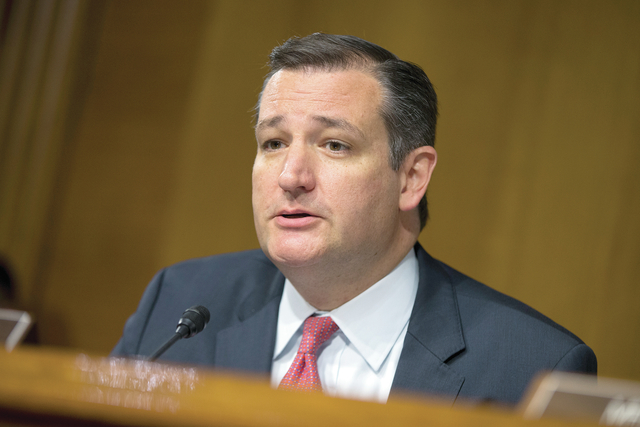Cruz to vote for Trump, whom he once called ‘utterly amoral’

WASHINGTON — Ted Cruz announced Friday he will vote for Donald Trump, a dramatic about-face that may help unite a deeply divided Republican Party months after the fiery Texas conservative called Trump a “pathological liar” and “utterly amoral.”
ADVERTISING
Cruz said he was simply following through on a promise to support his party’s presidential nominee, even though the New York billionaire had nicknamed him “Lyin’ Ted,” insulted his wife and linked his father to the John F. Kennedy assassination.
But facing intensifying political pressure to back Trump, Cruz said he would cast a vote for Trump, while stopping short of an official endorsement in a statement posted Friday on Facebook.
The distinction may matter little to voters, but helps Cruz save face among those supporters still unwilling to forgive Trump’s heated attacks during their ugly and often intensely personal primary campaign. Cruz was booed by Trump supporters at the national convention for encouraging Republicans to “vote your conscience.”
“After many months of careful consideration, of prayer and searching my own conscience, I have decided that on Election Day, I will vote for the Republican nominee, Donald Trump,” Cruz wrote Friday.
Trump accepted Cruz’s support, describing it as an “endorsement” in a statement. That’s even after Trump claimed he didn’t want Cruz’s endorsement immediately after the convention chaos.
“I am greatly honored by the endorsement of Senator Cruz,” Trump said Friday. “We have fought the battle and he was a tough and brilliant opponent. I look forward to working with him for many years to come in order to make America great again.”
The development comes as a critical time in the 2016 presidential contest
The first debate is on Monday and Election Day is less than seven weeks away. Early voting has already begun in some states. Trump and Democrat Hillary Clinton remain locked in a tight race as both struggle to unite their party’s behind them. Trump, in particular, has been branded as a phony by hard-line conservatives, Cruz among them, who see him more as a political opportunist than a true Republican.
“This man is a pathological liar. He doesn’t know the difference between truth and lies. He lies practically every word that comes out of his mouth,” Cruz said of Trump in May, hours before ending his campaign.
“Donald will betray his supporters on every issue,” the Texas senator added, while calling Trump “utterly amoral,” ”a narcissist,” ”a bully,” and “a serial philanderer,” among other things.
Clinton addressed the shift on social media by posting a tweet from Cruz himself calling on Trump to release his tax returns. The Texas senator released nine years of his returns, while Trump has refused to release any.
Her running mate, Virginia Sen. Tim Kaine took a dig at Cruz for expressing support despite the personal insults Trump rained down on him during the primaries.
“If somebody said that about my dad, they would never have me as a supporter for anything,” Kaine said as he campaigned in Texas.
Cruz finished second to Trump in the primary and balked at previous promises to endorse the eventual nominee. On Friday, he cited two reasons for his shift.
“First, last year, I promised to support the Republican nominee. And I intend to keep my word,” he wrote. “Second, even though I have had areas of significant disagreement with our nominee, by any measure Hillary Clinton is wholly unacceptable — that’s why I have always been #NeverHillary.”
Cruz also faced intensifying political pressure from all quarters.
Since the convention speech, polls have suggested that Cruz’s popularity was slipping nationally and in Texas — where he could face a primary challenger for re-election in 2018.
His base supported his refusal to back Trump at first, but the mood shifted recently. The vast majority of calls coming into Cruz’s office had turned increasingly negative in recent weeks with many voters urging him to support Trump to prevent a Clinton victory, according to Republicans familiar with the situation. The Republicans spoke on the condition of anonymity because these were internal discussions.
At the same time, the large staff that worked on Cruz’s presidential bid pushed him not to endorse. Most refused to accept jobs with the Trump campaign when offered following Cruz’s departure from the primary campaign this spring. And as recently as this week, some warned they would not work for Cruz again if he officially endorsed Trump.
Cruz’s decision also comes as he weighs the prospect of a 2020 presidential bid, where Trump’s donors could play an important role. None are more important than the Mercer family, which backed a pro-Cruz political group this spring before becoming major Trump backers.
Trump’s naming of Cruz ally, Utah Sen. Mike Lee, in his updated list of potential Supreme Court picks announced Friday helped ease tensions between the two camps. Trump also backed Cruz’s position in a congressional squabble over internet regulation.
Yet bad blood remains.
The decision to announce his intention to vote for Trump, rather than endorse him outright, was seen as a compromise — even if voters see little distinction between the two. Other Republican leaders in difficult political situations, notably New Hampshire Sen. Kelly Ayotte, have taken similar positions.
“Hillary Clinton is manifestly unfit to be president, and her policies would harm millions of Americans,” Cruz wrote Friday. “And Donald Trump is the only thing standing in her way.”


